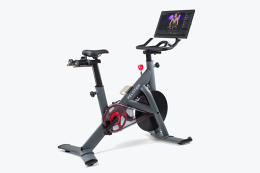Peloton Wants You To Keep Spinning Your Wheels When You Travel
Peloton, the high-tech fitness startup whose interactive exercise bikes let people pedal along at home to live-streamed workout routines, is expanding into the out-of-home market for the first time. The company today is announcing a new industrial-grade cycle intended for public places like hotel gyms, college campuses, military bases, or anywhere people work out.
For the four-year-old indoor cycling operation, the move marks a bold bet that its growing base of riders are loyal enough to the brand that they will actively seek out Peloton equipment when they visit gyms on the go. It’s also a way to potentially gain a crucial edge over competitors like FlyWheel and SoulCycle in the ballooning industry of so-called “boutique fitness,” where brand loyalty is embraced with cult-like fanaticism.
Complete with its own software platform, 22-inch “sweat-proof” screen, and Fitbit integration, Peloton’s new commercial cycle is only the second product the company has launched in its history. The announcement was shared with Fast Company in advance of a public demo later this week at CES in Las Vegas. Unlike Peloton’s current consumer bikes, which retail for $1,995, the new commercial-grade equipment is meant to accommodate multiple riders, with a re-engineered laser-cut steel frame that can withstand the wear and tear of regular public use.

John Foley, Peloton’s co-founder and chief executive, told me in a phone interview that the new product is a response to demand from existing customers, particularly business travelers who say they want to be able to replicate their home exercise routines when they’re traveling for work. Peloton has built its following with high-intensity spin classes taught by popular instructors like Robin Arzon and Alex Toussaint. The classes can be accessed via live-stream or on-demand and watched on high-definition touch screens mounted directly on Peloton’s home bikes.
Expanding on that concept, Peloton’s new bike promises the same experience in commercial spaces. Foley says a Peloton bike located in, say, a hotel or public gym could offer instant familiarity to travelers looking to combat the disorienting malaise of business trips.
“When you think about traveling, especially for business, you’re going to be eating more, you’re going to be drinking more, you’re out of your routine,” he says. “So to have that access to a 45-minute fantastic workout with your favorite instructor right there at your hotel is a pretty cool thing.”
In addition to hotel gyms, the bikes could even be placed directly into rooms—a way for hotels to differentiate themselves in the bid to attract health-conscious travelers. Eventually, Peloton’s website will include a locator map showing which hotels across the country include Peloton bikes.

How big the demand will be remains to be seen, but Foley is optimistic that it will be sizable enough to encourage hotels and other commercial operations to participate. Although Peloton declined to share specific membership or revenue figures, it says sales of its bikes have grown rapidly over the last year, going from 20,000 units in 2015 to an estimated 60,000 in 2016. It says its current rider base is in the “hundreds of thousands.”
Placing bikes in commercial spaces wouldn’t just appeal to those existing customers, but could attract new ones. The software for the new bike includes a marketing layer that quickly shows first-time users how to operate it. All you need to get started is an email address and a little ambition. If you use one of the bikes at your hotel, expect a follow-up email that summarizes your workout metrics and includes a friendly reminder that—yes—you, too, can own a Peloton cycle of your very own.
Hotels are just the beginning. Foley says other potential locations could include college campuses, hospitals, military bases, or even firehouses. “Those guys, as you know, like fitness,” he says of firefighters. “Random places like that are actually perfect use cases.”
The new bike will be offered to a set of commercial partners before being rolled out nationwide in the spring, priced at $2,995 plus $495 a year—inclusive of subscription and warranty. Foley says Peloton tried to keep the cost reasonable for vendors. He pitches the company as a kind of Apple meets HBO and Netflix, with the ultimate goal being to attract new subscribers and keep them hooked on the virtual classes. In other words, it’s all about the spin.
“Digital content is the core of our business model, so we’re trying not to be greedy on the hardware,” Foley says. “We want to get as many bikes in the marketplace as possible.”
Related Video: Why Peloton Says They Have No Competition
Fast Company , Read Full Story
(81)














